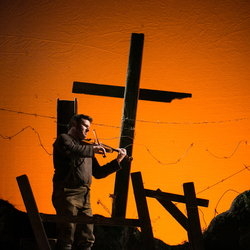Birdsong (Tour – York Theatre Royal)
Rachel Wagstaff’s stage adaptation of Sebastian Faulks’ 1993 novel, ”Birdsong”, is a “good-looking, ambitious production”
In his programme notes, Sebastian Faulks admits to some scepticism when Rachel Wagstaff first approached him with the idea of adapting his 1993 novel Birdsong for the stage. Judging by this production, his concerns were not totally unfounded.

© Jack Ladenburg
The novel has huge scope, spanning several decades, countries and generations. In making this story fit the temporal and spatial constraints of a theatre setting, it is inevitable that some elements may be lost. The question is will so much be lost as to compromise the overall impact of the story? In this case, the answer is yes and no.
The story of Wraysford and Isabelle’s affair is not given enough time to breathe and develop here. What we get is a highlights package of the key moments of their relationship, but the depth of their love for each other and the shattering impact being separated by the Great War has on them never quite hits home.
Conversely, it is impossible not to be moved by the handling of life in the trenches, and tunnels, during WWI. This production particularly excels when it uses the small, personal stories of the men and women on the front line to highlight both the insanity and futility of war as a whole as well as the devastating impact on the individual.
Aided by an excellent set (Victoria Spearing) and evocative sound (Dominic Bilkey) and lighting (Alex Wardle), this representation of the horror of conflict reaches its peak at the end of the first act with a highly emotional scene depicting the final moments before the soldiers go over the top in to no man’s land.
Act II doesn’t quite hit these heights again, as more focus is given to the Wraysford/Isabelle relationship and a truncated sequence involving Firebrace and Wraysford trapped in a tunnel.
There is a clash of acting styles, for example, between the broader theatricality of George Banks (Wraysford) and Peter Duncan (Firebrace) and the more subtle and nuanced performances of Carolin Stoltz (Isabelle) and Elizabeth Croft (Jeanne), that is at times jarring, particularly when sharing the stage together. Of the onstage talent, particular mention should go to Samuel Martin, whose beautifully understated singing adds a haunting poignancy to many scenes.
Ultimately, Birdsong is a good-looking, ambitious production which doesn’t always succeed, but when it does, achieves moments of intense emotion.
Birdsong runs at York Theatre Royal until 29 March and then continues to tour, returning to Yorkshire at the Hull New Theatre (19-24 May) and Cast Doncaster (27-31 May).












